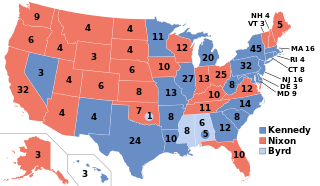
The 1960 United States presidential election was the 44th quadrennial presidential election. It was held on Tuesday, November 8, 1960. In a closely contested election, Democratic Senator John F. Kennedy defeated the incumbent Republican Vice President Richard Nixon. This was the first election in which 50 states participated, marking the first participation of Alaska and Hawaii, and the last in which the District of Columbia did not. This made it the only presidential election where the threshold for victory was 269 electoral votes. It was also the first election in which an incumbent president—in this case, Dwight D. Eisenhower—was ineligible to run for a third term because of the term limits established by the 22nd Amendment.
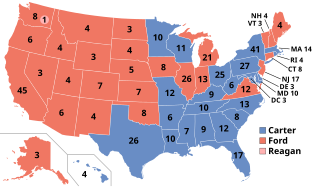
The 1976 United States presidential election was the 48th quadrennial presidential election, held on Tuesday, November 2, 1976. Democrat Jimmy Carter, former Governor of Georgia, defeated incumbent Republican president Gerald Ford in a narrow victory. This was the first presidential election since 1932 in which the incumbent was defeated, as well as the only Democratic victory of the six presidential elections between 1968 and 1988.

During presidential election campaigns in the United States, it has become customary for the candidates to engage in one or more debates. The topics discussed in the debate are often the most controversial issues of the time, and arguably elections have been nearly decided by these debates. Candidate debates are not constitutionally mandated, but they are now considered an intrinsic part of the election process. The debates are targeted mainly at undecided voters; those who tend not to be partial to any political ideology or party.

Debate is a process that involves formal discourse, discussion, and oral addresses on a particular topic or collection of topics, often with a moderator and an audience. In a debate, arguments are put forward for common opposing viewpoints. Debates have historically occurred in public meetings, academic institutions, debate halls, coffeehouses, competitions, and legislative assemblies. Debates have also been conducted for educational and recreational purposes, usually associated with educational establishments and debating societies. These debates emphasized logical consistency, factual accuracy, and emotional appeal to an audience. Modern forms of competitive debate also include rules for participants to discuss and decide upon the framework of the debates.

The Commission on Presidential Debates (CPD) is a nonprofit corporation established in 1987 under the joint sponsorship of the Democratic and Republican political parties in the United States. The CPD sponsors and produces debates for U.S. presidential and vice-presidential candidates and undertakes research and educational activities relating to the debates. It has run all of the presidential debates held since 1988. The commission's debates are sponsored by private contributions from foundations and corporations as well as fees from hosting institutions.
The United States presidential election debates were held in the 2004 presidential election. Three debates were held between Republican incumbent George W. Bush and Democratic candidate John Kerry, the major candidates, and one debate was held with their vice presidential running mates, incumbent Dick Cheney and John Edwards. All four debates were sponsored by the non-profit Commission on Presidential Debates (CPD), which has organized presidential debates since its establishment in 1987.
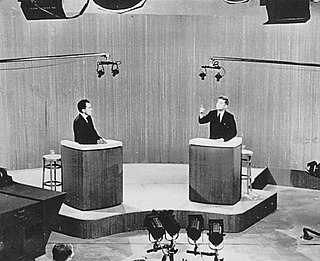
A leaders' debate or presidential debate is a public debate held during a general election campaign, where the candidates expose their political opinions and public policy proposals, and criticism of them, to potential voters. They are normally broadcast live on radio, television and the Internet. The events may be organized by media corporations or non-government organizations.
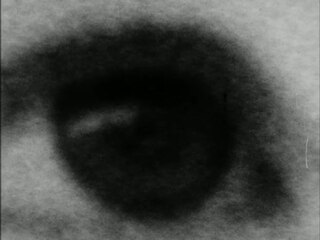
In politics, campaign advertising is propaganda through the media to influence a political debate and, ultimately, voters. Political consultants and political campaign staff design these ads. Many countries restrict the use of broadcast media to broadcast political messages. In the European Union, many countries do not permit paid-for TV or radio advertising for fear that wealthy groups will gain control of airtime, making fair play impossible and distorting the political debate.

The 1962 California gubernatorial election was held on November 6, 1962. The Democratic incumbent, Pat Brown, ran for re-election against former U.S. vice president and 1960 Republican presidential nominee Richard Nixon. In his concession speech the following morning, Nixon accused the media of favoring his opponent Brown, stating that it was his "last press conference" and "You won't have Nixon to kick around any more." Six years later, Nixon was elected President of the United States, and exactly ten years after this press conference he was re-elected in a landslide.
The United States presidential debates of 2008 were sponsored by the Commission on Presidential Debates (CPD), a bipartisan organization that sponsored four debates that occurred at various locations around the United States in September and October 2008. Three of the debates involved the presidential nominees, and one involved the vice-presidential nominees.

The election of the president and the vice president of the United States is an indirect election in which citizens of the United States who are registered to vote in one of the fifty U.S. states or in Washington, D.C., cast ballots not directly for those offices, but instead for members of the Electoral College. These electors then cast direct votes, known as electoral votes, for president, and for vice president. The candidate who receives an absolute majority of electoral votes is then elected to that office. If no candidate receives an absolute majority of the votes for president, the House of Representatives elects the president; likewise if no one receives an absolute majority of the votes for vice president, then the Senate elects the vice president.

An election for a seat in the United States House of Representatives took place in California's 12th congressional district on November 5, 1946, the date set by law for the elections for the 80th United States Congress. In the 12th district election, the candidates were five-term incumbent Democrat Jerry Voorhis, Republican challenger Richard Nixon, and former congressman and Prohibition Party candidate John Hoeppel. Nixon was elected with 56% of the vote, starting him on the road that would, almost a quarter century later, lead to the presidency.

The 1968 presidential campaign of Richard Nixon, the 36th vice president of the United States, began when Nixon, the Republican nominee of 1960, formally announced his candidacy, following a year's preparation and five years' political reorganization after defeats in the 1960 presidential election and the 1962 California gubernatorial election.

The 2016 presidential campaign of Gary Johnson, the 29th Governor of New Mexico, was announced on January 6, 2016, for the nomination of the Libertarian Party for President of the United States. He officially won the nomination on May 29, 2016, at the Libertarian National Convention in Orlando, Florida, receiving 56% of the vote on the second ballot. Former Massachusetts Governor William Weld was endorsed by Johnson for the Libertarian vice-presidential nomination, which he also received on May 29, 2016.
A total of ten debates occurred among candidates in the campaign for the Democratic Party's nomination for the president of the United States in the 2016 presidential election.
The Luzon leg of the PiliPinas Debates 2016 is the third and final presidential debate of the 2016 Philippine elections, was held at the University of Pangasinan in Dagupan on April 24, 2016. It was organized by COMELEC and KBP with ABS-CBN, and Manila Bulletin as media partners.
A series of political debates were held between the Libertarian candidates for US president in the 2016 presidential election.
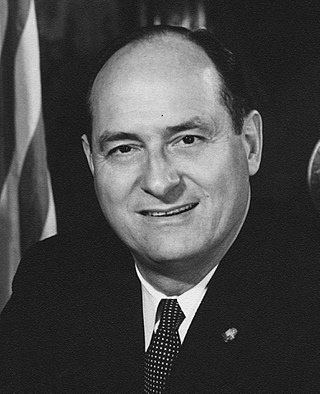
The 1960 Washington gubernatorial election took place on November 8, 1960, between incumbent Democratic governor Albert Rosellini and State Superintendent of Public Instruction Lloyd J. Andrews, nominated by the Republican Party.
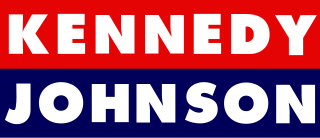
The 1960 presidential campaign of John F. Kennedy, then junior United States senator from Massachusetts, was formally launched on January 2, 1960, as Senator Kennedy announced his intention to seek the Democratic Party nomination for the presidency of the United States in the 1960 presidential election.
The 1992 United States presidential debates were a series of debates held for the presidential election.














